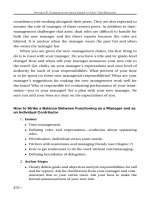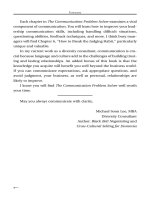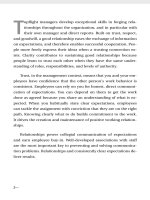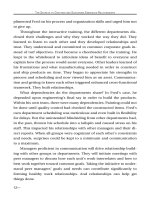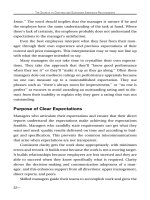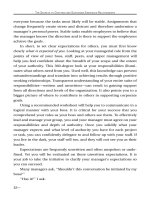The Communication Problem Solver 2 pdf
Bạn đang xem bản rút gọn của tài liệu. Xem và tải ngay bản đầy đủ của tài liệu tại đây (60.61 KB, 10 trang )
F
OREWORD
Each chapter in The Communication Problem Solver examines a vital
component of communication. You will learn how to improve your lead-
ership communication skills, including handling difficult situations,
questioning abilities, feedback techniques, and more. I think busy man-
agers will find Chapter 6, ‘‘How to Break the Judging Habit,’’ particularly
unique and valuable.
In my current work as a diversity consultant, communication is cru-
cial because language and culture add to the challenges of building trust-
ing and lasting relationships. An added bonus of this book is that the
knowledge you acquire will benefit you well beyond the business world.
If you can communicate expectations, ask appropriate questions, and
avoid judgment, your business, as well as personal, relationships are
likely to improve.
I know you will find The Communication Problem Solver well worth
your time.
May you always communicate with clarity,
Michael Soon Lee, MBA
Diversity Consultant
Author: Black Belt Negotiating and
Cross-Cultural Selling for Dummies
x—
Preface
If you were to think about your work communication issues, what would
they be? Are you paying attention to the ‘‘uh-oh’’ feeling in your gut
when tension arises among people at work? Or do you ignore your intu-
ition about these communication challenges and hope they will go away
on their own?
As a professional speaker, management trainer, consultant, and for-
mer manager, I have worked with leaders from all over the world. They
have ranged from potential managers to the most senior executives and
officers. All had professional competence and were committed to their
organizations’ success.
These managers work hard to continually expand their knowledge
and skills. Yet, no matter what management topic we address, communi-
cation is usually the underlying problem. When a manager has difficulty
giving feedback, coaching, or delegating, it most often is due to ‘‘people
problems’’—challenges the manager would rather avoid or does not
know how to handle.
Regardless of where they work or how long they have managed,
many managers struggle to develop work relationships and communi-
cate more effectively. Managers know the ‘‘what’’ and the ‘‘how’’ of the
job. Problems erupt when communicating tasks and discussing progress.
People get upset and communication breaks down. ‘‘Work would be
great if it weren’t for the people,’’ many managers joke. But people prob-
lems are the predicaments that keep them awake at night.
So why not solve the people problems first? Perhaps it is because
—xi
P
REFACE
these challenges are both the most uncomfortable and the ones without
deadlines. Or maybe it is because busy managers simply do not know
how.
If you are reading this book, you are probably interested in improv-
ing communication at your workplace. This book will make your life eas-
ier by:
? Expanding your confidence to handle the ‘‘tough stuff’’
? Showing how to energize your work environment
? Boosting your ability to delegate, give feedback, and coach
? Slashing wasted time due to misunderstandings about assignments
? Increasing productivity in your team by enhancing relationships
? Diminishing friction
? Perking up your communication proficiency
The Communication Problem Solver: Simple Tools and Techniques for
Busy Managers offers a dramatically different approach to management
communication. This book guides you through communication mine-
fields and helps you prevent them in the future. Once you have read
it, you will want this problem-solving book on your desk for continual
reference.
Real-world stories and practical examples will capture your interest
and illustrate proven action steps. You will be able to lift the solutions
off the page or adapt the ideas to your own solutions.
In any economy, managers need topflight communication skills to
keep staff productive and collaborative. This book will help you set clear
expectations, develop collaborative relationships, and avoid imprecise
judgments. It will sharpen your listening skills to grasp information bet-
ter in every conversation.
Many communication issues seem overwhelming because they are
vague and trigger emotional responses. The Communication Problem
xii—
P
REFACE
Solver is your key to redefining communication problems in factual
terms, then solving them once and for all.
The examples in this book are true, but the names have been
changed to provide privacy. The exception is when someone has given
authorization to be quoted: Their full names are shown.
—xiii
This page intentionally left blank
Acknowledgments
A special thanks to Ellen R. Kadin, executive editor, and Barry H. Rich-
ardson, senior development editor, at AMACOM Books, who made this
book a reality. Thanks also to the thousands of thoughtful managers and
seminar participants who worked with me over the years. I am deeply
grateful to the many people who participated so generously with quotes
and stories, which enriched the book. Warm thanks also to the many
people who supported this project:
> Paula Rankin, whose strong belief that I would succeed energized
me.
> In memory of Loretto and Joseph Rundle, my loving parents, who
gave me faith and education, and always told me I could achieve
anything I set my mind to.
> Hugh Rundle, Jane Rundle, Mary and David Baker, Virginia and Ken
Paulin, and their families.
> Elizabeth Koehler-Pentacoff, who helped me launch this project and
advised me throughout.
> Michael Soon Lee, who mentored me through the process.
> Dr. Edward P. Miranda, plastic and reconstructive surgeon of San
Francisco, for his successful surgeries on my hand during the writing
of this book.
> Sharon Lawrence for the meditation classes and great energy work.
> Ian Griffin, president, National Speakers Association Northern Cali-
fornia, for interviewing me about my book for his first podcast.
> Camille Minichino (aka Margaret Grace) for advice and help.
—xv
A
CKNOWLEDGMENTS
> Critique group friends: Susan Berman, David George, Cheryl Spanos,
Jack Russ, Fran Cain, Margaret Ramirez, Elisabeth Tuck, and Jill
Hedgecock.
> And all the relatives, friends, and colleagues not mentioned by name
but always remembered.
xvi—
THE COMMUNICATION
PROBLEM SOLVER
This page intentionally left blank
PART
I
THE SECRETS TO CREATING
AND SUSTAINING ENERGIZED
RELATIONSHIPS



